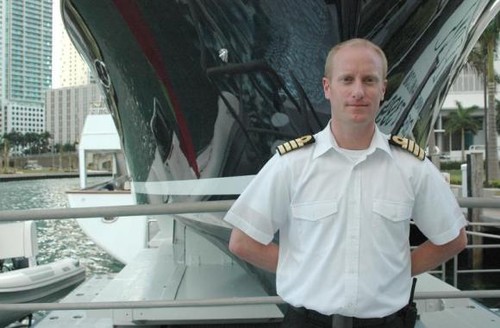Scientific expedition ship starts a new journey
by Dorie Cox, The Triton on 21 Feb 2011

Golden Shadow skipper Steven Breen - photo Dorie Cox SW
The ocean and its environment is always important to those who spend time on the water, and studying them is more and more occupying the minds of scientists in order to map what is happening to our planet as well as monitoring the sea-life.
Dorie Cox of www.thetriton.com!The_Triton, writes of another worthy example:
Capt. Steven Breen will guide the 220-foot M/Y Golden Shadow on its next scientific journey, a four-year expedition to gather and share data on the state of coral reefs worldwide.
Based in Miami for the first leg of the journey, Capt. Breen, scientists and ocean philanthropists met last night to talk about the trip and raise money for the http://www.seakeepers.org!International_SeaKeepers_Society.
'Golden Shadow serves as a research platform and we’ve done four previous expeditions in the Red Sea for this cause,' said Breen, who has been on the yacht four years.
Golden Shadow is the original shadow boat and part of the Golden fleet that includes the 265-foot M/Y Golden Odyssey built by Blohm + Voss for Prince Khaled bin Sultan of Saudi Arabia. Golden Shadow has carried ocean and atmospheric testing equipment from SeaKeepers for years and was recently refit with a new version that allows scientists access to the data for further research.
The trip begins in the Bahamas.
'Hogsty Reef asked us for maps of the condition of their reefs and they will use the information we share to protect their habitat,' said Dr. Andy Bruckner, chief scientist for the Khaled bin Sultan Living Oceans Foundation. 'Golden Shadow became dedicated for structured research with the goal of reversing the present trends in the coral reef ecosystems.'
Capable of transporting 24 crew and 24 guests, the vessel will visit Third World countries and isolated areas that often do not have infrastructure to process waste, protect habitats and deal with other threats to reefs.
'Our goal is to get into really remote locations,' Bruckner said. 'Those are the areas where less research is being done. They have the healthiest reefs, but are in danger of degradation.'
After the Bahamas, the Golden Shadow will head to the Caribbean for the rest of this year and next, Bruckner said. After that, to the Panama Canal, the Galapagos and then to French Polynesia. The yacht will change base as it changes geographic region, including to Tahiti and Sydney.
'These areas will give us a chance to see what reefs should really look like when they’re healthy,' Bruckner said. 'It is planned now to be a four-year expedition, but it will probably be extended to five or six years.'
The research will be supported by several systems integrated through a geographic information system (GIS) that combines geographically referenced information.
'Data collected initially focuses on habitat mapping through satellite images of reflected light, as well as data from the use of acoustic sensors,' Bruckner said.
Then the vessel will navigate through the mapped areas to gather more data. At that point, a dive team can get on-site to record visual data about the coral, fish and ecosystem.
All of this will be integrated with the SeaKeeper equipment data as it gathers GPS location, wind speed and direction, air temperature, barometric pressure, relative humidity, sea surface temperature, salinity, pH and oxygen levels.
After gathering data, the Living Oceans Foundation will share the information with the reefs’ nations and suggest steps to help preserve them. For more on the journey, visit www.globalreefexpedition.com.
For more news from the world of the professional captain, go to www.thetriton.com!The_Triton.
If you want to link to this article then please use this URL: www.sail-world.com/80496